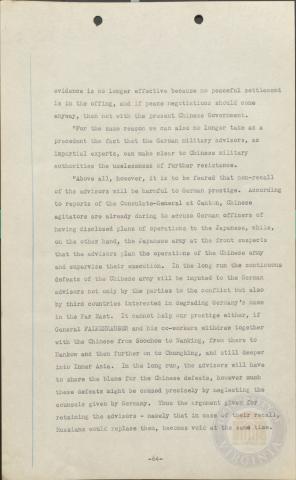
Page 64
| Parent | Collaboration Between Japan, Germany and Italy - Volume II |
|---|---|
| Date | 25 November 1941 |
| Language | English |
| Collection | Tavenner Papers & IMTFE Official Records |
| Box | Box 15 |
| Folder | Japan, Germany, Italy Collaboration Vol 2 |
| Repository | University of Virginia Law Library |
evidence is no longer effective because no peaceful settlement is in the offing, and if peace negotiations should come anyway, then not with the present Chinese Government.
"For the same reason we can also no longer take as a precedent the fact that the German military advisors, as impartial experts, can make clear to Chinese military authorities the uselessness of further resistance.
"Above all, however, it is to be feared that non-recall of the advisors will be harmful to German prestige. According to reports of the Consulate-General at Canton, Chinese agitators are already daring to accuse German officers of having disclosed plans of operations to the Japanese, while, on the other hand, the Japanese army at the front suspects that the advisors plan the operations of the Chinese army and supervise their execution. In the long run the continuous defeats of the Chinese army will be imputed to the German advisors not only by the parties to the conflict but also by third countries interested in degrading Germany's name in the Far East. It cannot help our prestige either, if General FALKENHAUSEN and his co-workers withdraw together with the Chinese from Soochow to Nanking, from there to Hankow and then further on to Chungking, and still deeper into Inner Asia. In the long run, the advisors will have to share the blame for the Chinese defeats, hoi/ever much these defeats might be caused precisely by neglecting the counsels given by Germany. Thus the argument given for retaining the advisors - namely that in case of their recall, Russians would replace them, becomes void at the same time.
